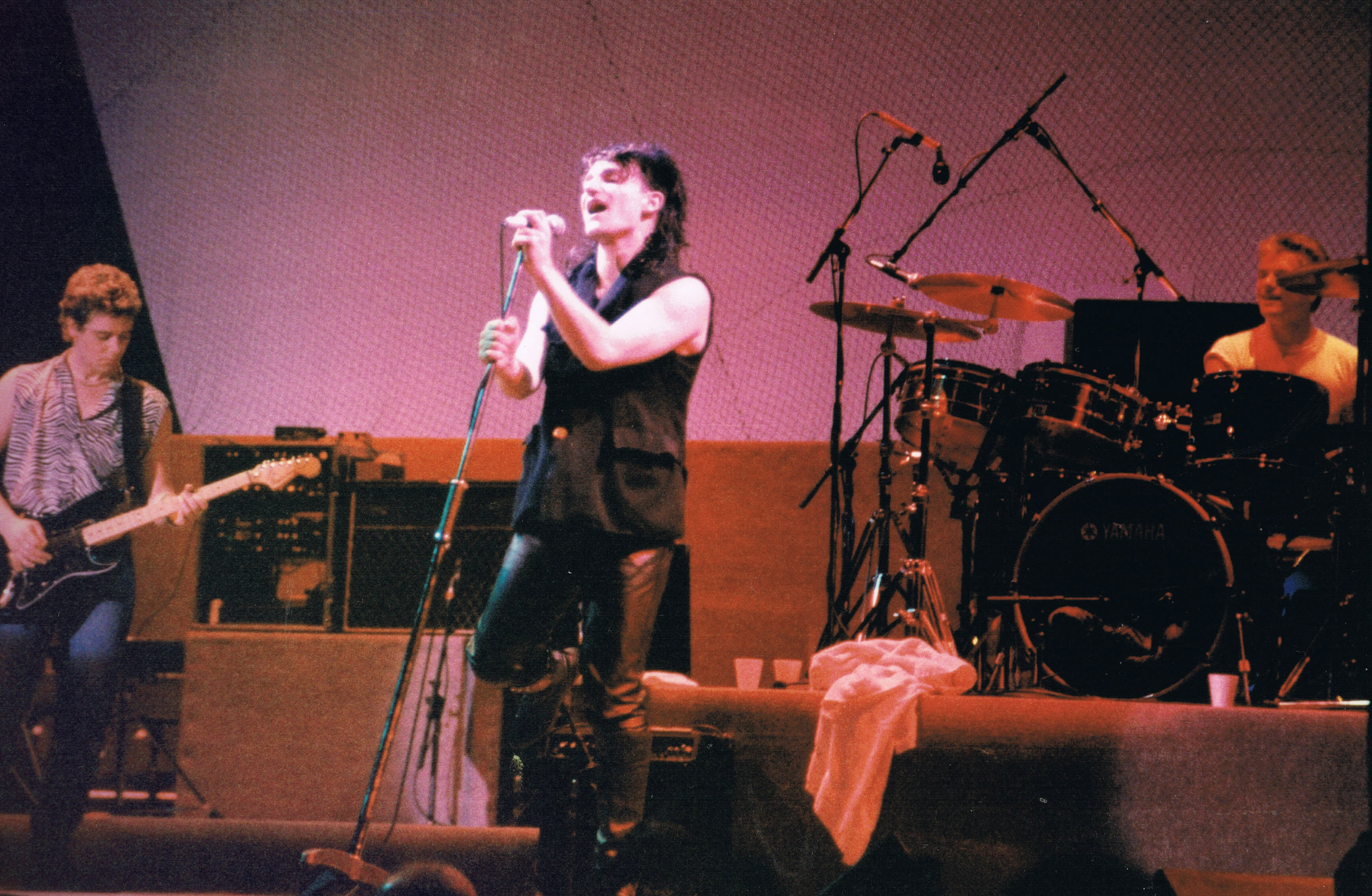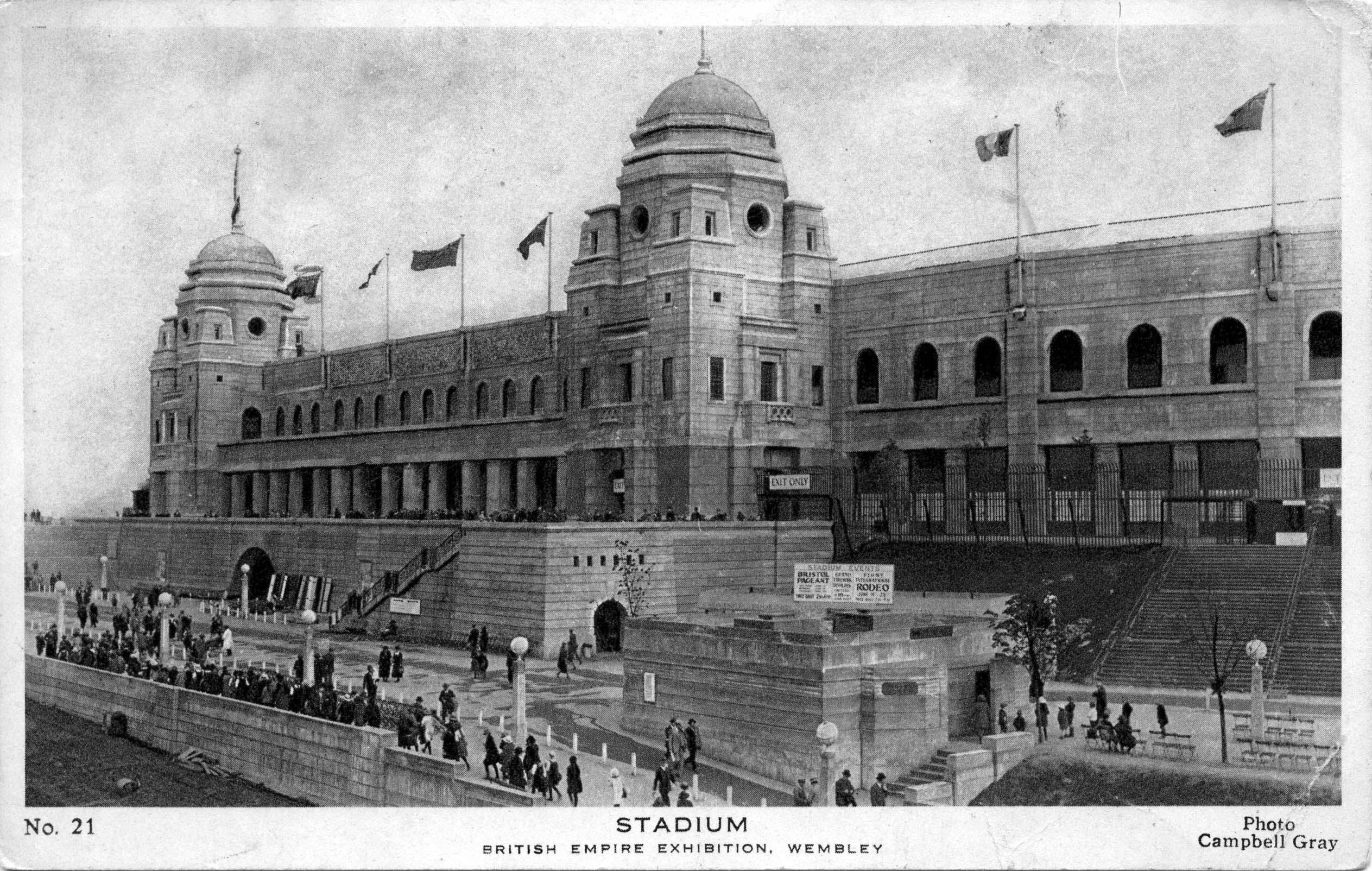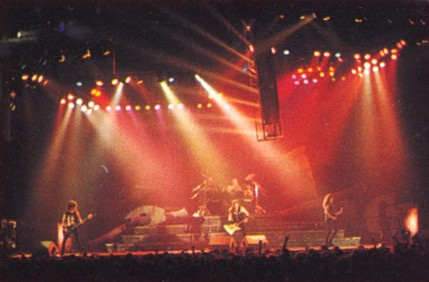|
Unforgettable Fire Tour
The Unforgettable Fire Tour was a concert tour by Irish rock band U2 that took place in 1984 and 1985 in support of band's album ''The Unforgettable Fire''. Beginning in August 1984 with the band's first tour to Australia and New Zealand, the tour spanned four further legs which included 43 concerts in Europe and 50 in North America. Initially challenged by the sonic complexity of the new album's material, the band were able to translate the complex layered atmospheric textures of the new studio-recorded tracks to live performance through the use of programmed sequencers, which the band until then had been reluctant to use. Since then sequencers are now used on the majority of U2 songs in performance. Songs criticised as being "unfinished", "fuzzy" and "unfocused" on the album, including the live favourite, " Bad", made more sense on stage. For the first time, U2 consistently played in arenas instead of smaller halls and theatres, and sometimes for multiple nights. The group h ... [...More Info...] [...Related Items...] OR: [Wikipedia] [Google] [Baidu] |
The Unforgettable Fire
''The Unforgettable Fire'' is the fourth studio album by Irish rock band U2. It was produced by Brian Eno and Daniel Lanois, and released on 1 October 1984 by Island Records. The band wanted to pursue a new musical direction following the harder-hitting rock of their previous album, ''War'' (1983). As a result, they employed Eno and Lanois to produce and assist in their experimentation with a more ambient sound. The resulting change in direction was at the time the band's most dramatic. The album's title is a reference to "The Unforgettable Fire", an art exhibit about the atomic bombing of Hiroshima. Recording began in May 1984 at Slane Castle, where the band lived, wrote, and recorded to find new inspiration. The album was completed in August 1984 at Windmill Lane Studios. It features atmospheric sounds and lyrics that lead vocalist Bono describes as "sketches". "Pride (In the Name of Love)" and " MLK" are lyrical tributes to Martin Luther King Jr. ''The Unforgettable Fir ... [...More Info...] [...Related Items...] OR: [Wikipedia] [Google] [Baidu] |
Rolling Stone
''Rolling Stone'' is an American monthly magazine that focuses on music, politics, and popular culture. It was founded in San Francisco, California, in 1967 by Jann Wenner, and the music critic Ralph J. Gleason. It was first known for its coverage of rock music and political reporting by Hunter S. Thompson. In the 1990s, the magazine broadened and shifted its focus to a younger readership interested in youth-oriented television shows, film actors, and popular music. It has since returned to its traditional mix of content, including music, entertainment, and politics. The first magazine was released in 1967 and featured John Lennon on the cover and was published every two weeks. It is known for provocative photography and its cover photos, featuring musicians, politicians, athletes, and actors. In addition to its print version in the United States, it publishes content through Rollingstone.com and numerous international editions. Penske Media Corporation is the current ... [...More Info...] [...Related Items...] OR: [Wikipedia] [Google] [Baidu] |
National Exhibition Centre
The National Exhibition Centre (NEC) is an exhibition centre located in Marston Green, Solihull, West Midlands, England. It is near junction 6 of the M42 motorway, and is adjacent to Birmingham Airport and Birmingham International railway station. It was opened by Queen Elizabeth II in 1976. History The NEC was originally going to be built adjacent to the M1 motorway (junction 21) near Leicester but it was turned down by Leicestershire County Council with claims that "The big shows won't move away from London". The building was designed by Edward Mills. In November 1971, the Secretary of State for the Environment granted outline planning approval for the National Exhibition Centre in Birmingham. On 16 February 1973, then Prime Minister Edward Heath travelled up from London to cut a white ribbon and initiate its construction. The NEC was opened by Queen Elizabeth II on 2 February 1976. Expansion of the complex The seventh hall of the NEC complex, a multi-purpose indoor arena ... [...More Info...] [...Related Items...] OR: [Wikipedia] [Google] [Baidu] |
4th Of July (U2 Song)
"4th of July" is a song by Irish rock band U2, and is the sixth track from their 1984 album, ''The Unforgettable Fire''. The song is an instrumental ambient track that was spontaneously improvised by bassist Adam Clayton and guitarist the Edge while producers Brian Eno and Daniel Lanois recorded, unbeknownst to the band. It has never been performed live, although Clayton did play it as a warm-up during a soundcheck before U2's concert in San Jose on 20 April 2001. Description "4th of July" came about almost entirely through a moment of inspiration from Eno. At the end of a studio session, Eno happened to overhear Adam Clayton doodling on a simple bass figure; he liked what he was hearing, so recorded it ''ad hoc'' as it was being played. Guitarist The Edge happened to join in, improvising a few guitar ideas over the top of Clayton's bass; neither knew they were being recorded. Eno added some treatments and then transferred the piece straight to two-track master tape – and th ... [...More Info...] [...Related Items...] OR: [Wikipedia] [Google] [Baidu] |
1983–1985 Famine In Ethiopia
A widespread famine affected Ethiopia from 1983 to 1985. The worst famine to hit the country in a century, it affected 7.75 million people (out of Ethiopia's 38–40 million) and left approximately 300,000 to 1.2 million dead. 2.5 million people were internally displaced whereas 400,000 refugees left Ethiopia. Almost 200,000 children were orphaned. According to Human Rights Watch, more than half its mortality could be attributed to "human rights abuses causing the famine to come earlier, strike harder and extend further than would otherwise have been the case". According to the United States Agency for International Development, "in the fall of 1984, the hardest hit regions were Tigray, Wollo, and Eritrea – areas with extremely limited road and transportation networks. Moreover, these regions were the scenes of longstanding anti-government rebellions which created precarious security situations". Other areas of Ethiopia experienced famine for similar reasons, re ... [...More Info...] [...Related Items...] OR: [Wikipedia] [Google] [Baidu] |
Wembley Stadium (1923)
The original Wembley Stadium (; originally known as the Empire Stadium) was a stadium in Wembley, London, best known for hosting important football matches. It stood on the same site now occupied by its successor. Wembley hosted the FA Cup final annually, the first in 1923, which was the stadium's inaugural event, the League Cup final annually, five European Cup finals, the 1966 World Cup Final, and the final of Euro 1996. Brazilian footballer Pelé once said of the stadium: "Wembley is the cathedral of football. It is the capital of football and it is the heart of football", in recognition of its status as the world's best-known football stadium. The stadium also hosted many other sports events, including the 1948 Summer Olympics, rugby league's Challenge Cup final, and the 1992 and 1995 Rugby League World Cup Finals. It was also the venue for numerous music events, including the 1985 Live Aid charity concert. In what was the first major WWF (now WWE) pay-per-view ... [...More Info...] [...Related Items...] OR: [Wikipedia] [Google] [Baidu] |
Croke Park
Croke Park ( ga, Páirc an Chrócaigh, ) is a Gaelic games stadium in Dublin, Ireland. Named after Archbishop Thomas Croke, it is referred to as Croker by GAA fans and locals. It serves as both the principal national stadium of Ireland and headquarters of the Gaelic Athletic Association (GAA). Since 1891 the site has been used by the GAA to host Gaelic sports, including the annual All-Ireland in Gaelic football and hurling. A major expansion and redevelopment of the stadium ran from 1991 to 2005, raising capacity to its current 82,300 spectators. This makes Croke Park the third-largest stadium in Europe, and the largest not usually used for association football in Europe. Other events held at the stadium include the opening and closing ceremonies of the 2003 Special Olympics, and numerous musical concerts. In 2012, Irish pop group Westlife sold out the stadium in record-breaking time: less than 5 minutes. From 2007 to 2010, Croke Park hosted home matches of the Ireland ... [...More Info...] [...Related Items...] OR: [Wikipedia] [Google] [Baidu] |
Dublin
Dublin (; , or ) is the capital and largest city of Ireland. On a bay at the mouth of the River Liffey, it is in the province of Leinster, bordered on the south by the Dublin Mountains, a part of the Wicklow Mountains range. At the 2016 census it had a population of 1,173,179, while the preliminary results of the 2022 census recorded that County Dublin as a whole had a population of 1,450,701, and that the population of the Greater Dublin Area was over 2 million, or roughly 40% of the Republic of Ireland's total population. A settlement was established in the area by the Gaels during or before the 7th century, followed by the Vikings. As the Kingdom of Dublin grew, it became Ireland's principal settlement by the 12th century Anglo-Norman invasion of Ireland. The city expanded rapidly from the 17th century and was briefly the second largest in the British Empire and sixth largest in Western Europe after the Acts of Union in 1800. Following independence in 1922, Dubli ... [...More Info...] [...Related Items...] OR: [Wikipedia] [Google] [Baidu] |
40 (U2 Song)
"40", also known as "40 (How Long)", is a song by Irish rock band U2. It is the tenth and final track on their 1983 album, ''War''. The song is noted for its live performances; guitarist the Edge and bassist Adam Clayton trade instruments during performances of it, and as it was commonly played to end their concerts, the band would leave the stage one-by-one as the audience continued to sing the refrain "How long to sing this song?". The lyrics are a modification of the Bible's Psalm 40. The song was released as a commercial single only in Germany, simply to promote U2's appearance at the Loreley Festival in 1983. The single was released on a 7-inch gramophone record with a B-side of the album version of "Two Hearts Beat as One". Since its live debut on 26 February 1983, in Dundee, "40" has been a staple of U2's live concerts, having been performed almost 400 times. Recording The song was completed within the last few hours of the recording sessions for ''War''. After working ... [...More Info...] [...Related Items...] OR: [Wikipedia] [Google] [Baidu] |
Metallica (album)
''Metallica'' (commonly known as ''The Black Album'') is the fifth studio album by American heavy metal band Metallica. It was released on August 12, 1991, by Elektra Records. Recording sessions took place at One on One Studios in Los Angeles over an eight-month span that frequently found Metallica at odds with their new producer Bob Rock. The album marked a change in the band's music from the thrash metal style of their previous four albums to a slower, heavier, and more refined sound. Metallica promoted ''Metallica'' with a series of tours. They also released five singles to promote the album: " Enter Sandman", " The Unforgiven", " Nothing Else Matters", " Wherever I May Roam", and "Sad but True", all of which have been considered to be among the band's best-known songs. The song " Don't Tread on Me" was also issued to rock radio shortly after the album's release but did not receive a commercial single release. ''Metallica'' received widespread critical acclaim and became t ... [...More Info...] [...Related Items...] OR: [Wikipedia] [Google] [Baidu] |
Damaged Justice
Damaged Justice was the fourth concert tour by the American heavy metal band Metallica. It began on September 11, 1988, and ended on October 8, 1989. The name is believed to be inspired either by the cover of its fourth studio album '' ...And Justice for All'', or by the song "Damage, Inc." from the group's previous album, ''Master of Puppets''. The single "One" was released during the tour. Itinerary The tour marked the first and, to date, only time that Metallica has played in the U.S. state of Delaware. On August 7, 1989, the band headlined a special and very drunken gig at Newark's Stone Balloon. Recordings The Damaged Justice tour was the first time the band had used live recordings of their concerts in single B-Sides and EP's (Those used on the ''Jump in the Fire'' single from 1984 were demos with faked audience noise dubbed over). The concert of February 5, 1989 was recorded and "For Whom the Bell Tolls", "Welcome Home (Sanitarium)", "Seek and Destroy" and "Creeping D ... [...More Info...] [...Related Items...] OR: [Wikipedia] [Google] [Baidu] |
Metallica
Metallica is an American heavy metal band. The band was formed in 1981 in Los Angeles by vocalist/guitarist James Hetfield and drummer Lars Ulrich, and has been based in San Francisco for most of its career. The band's fast tempos, instrumentals and aggressive musicianship made them one of the founding "big four" bands of thrash metal, alongside Megadeth, Anthrax and Slayer. Metallica's current lineup comprises founding members and primary songwriters Hetfield and Ulrich, longtime lead guitarist Kirk Hammett and bassist Robert Trujillo. Guitarist Dave Mustaine, who formed Megadeth after being fired from the band, and bassists Ron McGovney, Cliff Burton and Jason Newsted are former members of the band. Metallica first found commercial success with the release of its third album, ''Master of Puppets'' (1986), which is cited as one of the heaviest metal albums and the band's best work. The band's next album, '' ...And Justice for All'' (1988), gave Metallica its first Grammy ... [...More Info...] [...Related Items...] OR: [Wikipedia] [Google] [Baidu] |








